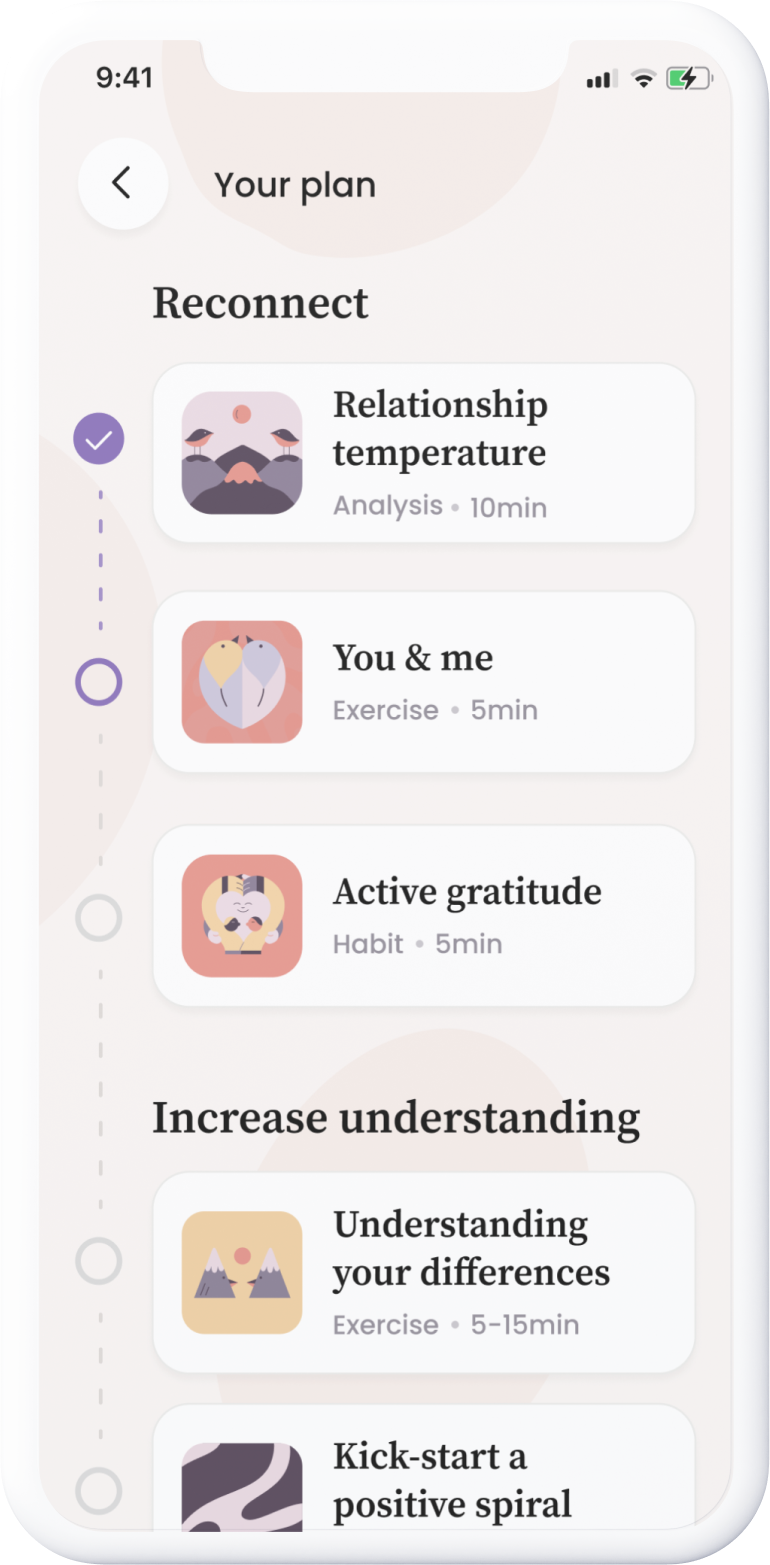Minimizing Conflict and Fighting Fair in a Relationship
Advice from psychologists- 13 July 2023
- 16min

Do you fight too much with your partner? Do you often think, "We love each other, but we fight all the time" ? Do you want to fight less and manage conflicts more constructively? In this blog post, we will discuss the causes of fights and provide our best tips on understanding and handling conflicts better. Learn how to fight fair!
How much fighting and arguing is normal in a relationship?
"I constantly argue with my husband. Almost anything can spark a conflict, and we can hardly discuss anything without starting an argument. I feel like he rarely listens to me, and he is always angry and annoyed. We still love each other and I want to be with him. How often is it normal to fight? When should we seek help?"
Yes, it is common to fight in a relationship. Almost all relationships experience conflicts from time to time. It is impossible to always agree, and disagreements can easily lead to heated arguments. Fighting with your partner occasionally is normal. However, frequently getting into quarrels and misunderstandings can be exhausting and draining. If you argue occasionally but quickly find warmth and closeness in your relationship again, it is completely normal. In fact, differences of opinion can be developmental, and it is not uncommon to reach a deeper emotional closeness after a conflict. Disagreements that lead to calm conversations can even strengthen your relationship!
How do you know if you fight too much? If you find yourselves frequently getting stuck in arguments about the same things, there is a risk that the pattern will continue in the wrong direction. If you often think, "We fight all the time," it sounds like it negatively affects your well-being, and you might need help to overcome it. There is much you can do on your own to break this destructive pattern!
Why do we fight all the time?
As psychologists, we hear about so many different kinds of fights in our therapy sessions! From big to small, from betrayals to unresolved household chores. One thing that is obvious is how deeply words can hurt and how easily emotions can be triggered when it comes to loaded topics. In many cases, the intention is good, but it still goes wrong.
What is the reason behind fights being so common in close relationships? One part of the explanation is simply that we are different. Different in terms of personality, opinions, and needs. When we want different things, both in small matters and major issues.These differences can easily create conflicts.
Fighting in different phases of a relationship
Early in a relationship, there is an exploration of each other and the relationship itself. Usually, there is curiosity, openness, and interest, which is positive for the relationship. We also strive to show our best sides. Usually it becomes more challenging over time and as we become more secure with each other. When couples face situations where their differences become more evident, conflicts easily arise.
These conflicts are often also enlightening. In the best-case scenario, they lead to productive conversations where both partners gain a deeper understanding of each other. It is easy to doubt the relationship if there is a lot of fighting early on, but if you can resolve those conflicts and they lead to good conversations, it doesn't necessarily mean something is wrong.
As the relationship becomes more established, there is a greater need for shared perspectives and making joint decisions based on what is good for both of you. It is impossible for you to always have the same opinions. When significant decisions need to be made, you are often put to the test. With increased shared responsibilities, such as living together and having children, potential areas of conflict multiply. Simply put, there are more things where you need to make decisions together.
Fight less by communicating more
When you have differing opinions, there is a much higher demand for clear and respectful communication. In a loving relationship, we are also very vulnerable. We have chosen to share our lives with this person, and that includes sharing our thoughts, feelings, and even our less flattering sides. When our partner has a different view, it can make us feel rejected or fearful that the relationship won't work. This fear also makes it difficult to address underlying issues.
Communication is not always easy! Often, we are not clear about what we actually think and feel. It is easy to assume that our partner can read our minds or "should" understand what we mean. Especially when we have different desires or needs, we often misinterpret each other. We might even think that our partner is completely unreasonable or wish us harm. Thus, fights often stem from communication difficulties. Listening to each other (even when we disagree!) is a crucial starting point for better mutual understanding.
Frequent fighting creates distance and loneliness
When a relationship is characterized by frequent fights, it often affects overall well-being. Feeling lonely in the relationship is common. There is also a sense of grief that life together may consist more of misunderstandings and arguments than warmth and closeness. When we meet couples in therapy, it is common for both partners to feel alone and misunderstood. Beneath the harsh words and conflicts, there is a desire to be loved for who you are and a fear of being abandoned. Living in a relationship with frequent fights affects one's well-being.
Moreover, repeated fights make it even harder to balance with the positive aspects. You are likely less inclined to bring your partner's favorite treat home after a long argument where you felt attacked and misunderstood. After walking around in a chilly atmosphere throughout the day, you are less eager to sit close to each other on the couch in the evening. Simply put, there isn't as much positivity buffering and contributing warmth and closeness. Once you're caught in this negative spiral, it is important to work on fighting more fairly and to add more joy to the relationship.
The importance of fair fighting - our 4 best tips!
Is it possible to fight fair? Absolutely! And your relationship has much to gain from it. Harsh comments can easily become toxic and linger long after the argument, even if they were said in the heat of the moment and not meant to hurt.
We will go through strategies that will help you fight less destructively. If you master these strategies, you will have better chances of handling disagreements without negatively affecting your relationship. One key element is accepting each other for who you are. We will discuss this in more detail, but it essentially means assuming that your partner wants the best for you but may have a different way of expressing it.
The very first step to fighting better (and thus fighting less) is to understand more about what triggers your fights. Often, there is something specific that triggers negative emotions in us. These emotions then lead to an impulse to act, such as starting an argument, raising our voices, or withdrawing. What usually triggers negative emotions for you? Are there specific topics you find difficult to discuss without it turning into a fight? Does your partner do something that triggers you? Can you identify recurring topics that often lead to conflicts? It could be related to parenting, division of responsibilities, finances, or any other area where you have different opinions.
#1 Wait until the strongest emotions have subsided
We know it's challenging! Emotions are powerful signals that drive us to act in certain ways. When we are really angry, it becomes difficult to be pleasant at the same time.
This means you consciously need to make an effort to calm yourself down before taking action. It will give you better chances of expressing yourself in a way that your partner can more easily receive.
Some tips on how to calm yourself down are to count to ten, take a moment to step away, or breathe out very slowly. Sometimes, the best thing to do is to sleep on it. No, falling asleep while still upset is not always worse! Continuing to argue throughout the night can cause more harm! Moreover, sleep deprivation gives you even worse conditions to calmly discuss with each other the next day. If you want to fight less destructively, it is always wise to reduce the harmful effects by taking responsibility for your own feelings.
#2 Focus on your experience instead of how your partner is
Perhaps you have heard of the communication skill called "I statements"? It is a communication technique used to express one's feelings, thoughts, or concerns in a non-confrontational and assertive manner. It is typically used in interpersonal situations or conflicts to express oneself without blaming or attacking the other person.This is of course, just like maintaining calmness, more challenging when you have a negative feeling.
When we are tired, stressed, angry, or sad, we interpret a neutral situation more negatively than when we are feeling great. And in a loaded situation with our partner, where negative feelings have been triggered before, we often make quick interpretations of our partner's actions. Take the example of having had a tough day and longing for your partner to come home from work. Once inside the door, your partner hurries in and starts using the computer without even greeting you.
You want to talk to your partner about this; the situation lingers and bothers you, and you start feeling unsure if you actually matter to your partner. In this situation, it is better to say, for example, "I feel sad and lonely when you don't show me appreciation," rather than expressing your interpretation, "You don't care about me anymore!" Try to be as specific as possible when describing the situation: "When I came home from work yesterday and you didn't say hello to me, I felt rejected." Be open to the possibility that your perception of what happened may not necessarily be the whole truth. Perhaps your partner was lost in their own thoughts and didn't notice you were home? Or maybe your partner doesn't realize how important this is to you.
#3 When receiving criticism - try to just listen (without defending yourself)
Being criticized is a part of life, both professionally and in our close relationships. And it is difficult; as humans, we are generally sensitive to criticism. Being told off or corrected easily triggers the feeling of shame, which is very uncomfortable to experience. It is therefore a natural impulse to want to defend yourself and explain why you did what you did (or why you are right)
However, following that impulse will not help you. It is likely to trigger your partner instead, and you may end up getting stuck in an argument. The very first step, therefore, is to listen, just listen. Regardless of whether you think what your partner is saying is completely ridiculous or if you can see some truth in it, start by trying to understand. Yes, we know it's difficult – but try! It doesn't mean you won't get a chance to express your perspective at all; on the contrary, your partner is likely to understand you better if you have first listened.
Three important aspects of active listening are showing interest by giving your full focus, demonstrating that you understand what your partner is expressing, and fully focusing on your partner's experience. Once you have listened and believe you have gained a better understanding of why it is important to your partner, you can share how it feels for you and what you are thinking.
#4 Give your partner the benefit of the doubt
If you fundamentally perceive your partner as a reasonable person and you actually know that they care about you – try to remind yourself of that even when you have a strong negative feeling! In other words: try to interpret your partner as kindly as possible.
As humans, we tend to interpret our surroundings based on our own experiences. When we are vulnerable (such as tired, stressed, angry, worried, or sad), we easily interpret neutral situations more negatively than when we are feeling great. In the midst of a loaded situation with our partner, we often make a quick interpretation of our partner's intentions. It is then very easy to interpret, for example, a reflection on something as criticism or a caring gesture as control. And if you make that interpretation, it affects your entire experience of the situation and your partner. There is a high chance that you see your partner as unreasonable and want to protest or present your point of view.
It can be helpful to remember that close relationships are not about proving who is right. It is more important for the relationship to show mutual understanding for each other. Therefore, despite the impulse to want to defend yourself against what you may perceive as criticism, try to make the most kind interpretation you can. Try to see the reasonableness in what your partner just did. If you can do that, and even show understanding for your partner's reaction, you have achieved something great!
Are there advantages to fighting in a relationship?
Constantly fighting is obviously destructive, but what about never fighting? Can that also be problematic? And what can the advantages be of fighting?
As we have already stated, it is impossible to always agree. Part of being in a mutual relationship is having the security to bring up thoughts and feelings with each other. Discussing and resolving disagreements, even if strong emotions arise and you don't understand each other at the moment, is fundamentally positive for the relationship. If you can quickly return to warmth and closeness after a fight and apologize to each other when you have hurt each other, fights don't necessarily have to be destructive. As long as they don't occur too frequently or contribute to one or both of you feeling too bad because of it.
And what if you never fight? Is that bad? It also depends! All couples have disagreements at some point; it is impossible to always have the exact same opinions. But disagreements don't necessarily have to lead to fights. If you know that you still address problems and have good conversations where you listen to each other and feel understood, congratulations! Then you likely have a good ability to communicate respectfully and consider each other's different opinions, and you can probably find ways to compromise when needed.








